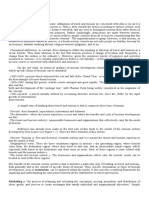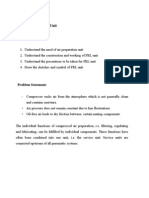Climate Change PDF
Climate Change PDF
Uploaded by
Porcia ScriptsCopyright:
Available Formats
Climate Change PDF
Climate Change PDF
Uploaded by
Porcia ScriptsOriginal Title
Copyright
Available Formats
Share this document
Did you find this document useful?
Is this content inappropriate?
Copyright:
Available Formats
Climate Change PDF
Climate Change PDF
Uploaded by
Porcia ScriptsCopyright:
Available Formats
Climate change is one of the most pressing issues of our time, and its impacts are already being
felt
around the world. As global temperatures continue to rise, we are seeing more frequent and severe
weather events, melting ice caps, and rising sea levels, among other changes. In this essay, we will
explore the causes and consequences of climate change, as well as potential solutions to address this
urgent issue.
The primary cause of climate change is the release of greenhouse gases, such as carbon dioxide and
methane, into the atmosphere. These gases trap heat from the sun and prevent it from escaping back
into space, leading to a warming of the Earth's surface. Human activities such as burning fossil fuels,
deforestation, and industrial processes have contributed to the increase in greenhouse gas emissions
over the past century.
The consequences of climate change are wide-ranging and potentially catastrophic. As temperatures
continue to rise, we are seeing changes in precipitation patterns, which can lead to more frequent
droughts, floods, and severe storms. Rising sea levels are threatening coastal communities, and melting
ice caps are changing the landscape of the Arctic and Antarctic regions. Climate change is also impacting
biodiversity, as species are forced to adapt to changing conditions or face extinction.
There are several potential solutions to address climate change. One key approach is to reduce
greenhouse gas emissions through the use of clean energy sources such as wind and solar power, as well
as through improved energy efficiency in buildings and transportation. Carbon capture and storage
technologies may also play a role in reducing emissions from industrial processes. Additionally, efforts to
reduce deforestation and promote reforestation can help to sequester carbon and reduce greenhouse
gas emissions.
Individual actions can also make a difference in addressing climate change. Reducing energy use through
conservation measures such as turning off lights and reducing heating and cooling can help to reduce
greenhouse gas emissions. Choosing to walk, bike, or take public transportation instead of driving can
also help to reduce emissions. Eating a plant-based diet can also be a way to reduce the carbon footprint
associated with food production.
In conclusion, climate change is a pressing issue that requires urgent action at all levels. The causes and
consequences of climate change are clear, and it is up to all of us to take steps to address this issue. By
reducing greenhouse gas emissions, promoting clean energy, and making individual lifestyle changes, we
can help to mitigate the impacts of climate change and ensure a sustainable future for generations to
come.
You might also like
- Primary School Grade 5 Physical Education PE 5 Week 5 WorkbookDocument5 pagesPrimary School Grade 5 Physical Education PE 5 Week 5 Workbookveemusi95No ratings yet
- Collection Development PFDocument3 pagesCollection Development PFapi-655942045No ratings yet
- Little Angels' College of Management: Q. Long Question Answer: (25 X 4 100)Document3 pagesLittle Angels' College of Management: Q. Long Question Answer: (25 X 4 100)Suman ChaudharyNo ratings yet
- MRID Self Paced Modules - FingerspellingDocument35 pagesMRID Self Paced Modules - FingerspellingTracyDAZNo ratings yet
- Year 10 Revision Booklet With Revision QsDocument61 pagesYear 10 Revision Booklet With Revision Qsamr ahmedNo ratings yet
- Alg1 02 Student JournalDocument31 pagesAlg1 02 Student JournalalexNo ratings yet
- LD002Document44 pagesLD002Kori KuncoroNo ratings yet
- Bubbles Lessons PDFDocument38 pagesBubbles Lessons PDFLászló SzabóNo ratings yet
- MRID Self Paced Modules - GrammarDocument40 pagesMRID Self Paced Modules - GrammarTracyDAZNo ratings yet
- Osslt 2012 - Released Selections and Test QuestionsDocument4 pagesOsslt 2012 - Released Selections and Test Questionsapi-320190637No ratings yet
- 2nd Year Nursing Assignment Working Area 5Document2 pages2nd Year Nursing Assignment Working Area 5Soliyana DenekewNo ratings yet
- Reflective EssayDocument5 pagesReflective Essayapi-657721782No ratings yet
- Paraphrased Research - Utilization of Social Media As A Business MarketingDocument8 pagesParaphrased Research - Utilization of Social Media As A Business MarketingJc CasabuenaNo ratings yet
- Strategic ManagementDocument5 pagesStrategic ManagementJm LosinNo ratings yet
- 1bsn3 Espiritu Activity 1 Finals Chapter 8Document2 pages1bsn3 Espiritu Activity 1 Finals Chapter 8Espiritu, ChriscelNo ratings yet
- IE Essay Aplication (2023) - Inés Oliveros OguroDocument2 pagesIE Essay Aplication (2023) - Inés Oliveros OguroInés Oliveros OguroNo ratings yet
- Alphabet Tracing A-ZDocument14 pagesAlphabet Tracing A-ZDonna PaduaNo ratings yet
- TDS DR Bio 7211 Compostable Filler FilmsDocument3 pagesTDS DR Bio 7211 Compostable Filler FilmsMukul SareenNo ratings yet
- Measurement Units WorksheetDocument2 pagesMeasurement Units WorksheetDante Gabriel RecideNo ratings yet
- Social Stratification in BangladeshDocument3 pagesSocial Stratification in BangladeshKhanzahan AliNo ratings yet
- Analysing Strategic Management For Sustainable Performance in The It Sector Chapter 1Document7 pagesAnalysing Strategic Management For Sustainable Performance in The It Sector Chapter 1Laiba HassanNo ratings yet
- Pepsi CoDocument13 pagesPepsi Coaungkyaw soeNo ratings yet
- Notes in CSRDocument14 pagesNotes in CSRMARY GRACE RAMOS OBCENANo ratings yet
- Measuring Units Worksheet: Name: - DateDocument3 pagesMeasuring Units Worksheet: Name: - DateSiti Noor Adliana AdillahNo ratings yet
- Tourism MarketingDocument2 pagesTourism MarketinglaughjerkerNo ratings yet
- Sample Questions: General Information About The Nation's Report CardDocument45 pagesSample Questions: General Information About The Nation's Report CardswainanjanNo ratings yet
- Marketing StrategyDocument4 pagesMarketing StrategyAsif AliNo ratings yet
- Crossword Commonly Used Words n4Document2 pagesCrossword Commonly Used Words n4TabbyKatNo ratings yet
- Alphabet Tracing Bundle WorksheetDocument26 pagesAlphabet Tracing Bundle Worksheetrestu awaliningsihNo ratings yet
- Grammar 6 - Fewer vs. LessDocument1 pageGrammar 6 - Fewer vs. LessNur HafezaNo ratings yet
- Irregular Verbs Test 1 PDFDocument1 pageIrregular Verbs Test 1 PDFSiti Ruqaiyah Abdul RahmanNo ratings yet
- Measuring Units Worksheet: Name: - DateDocument2 pagesMeasuring Units Worksheet: Name: - DateSwatiNo ratings yet
- Green Cursive Letters Handwriting WorksheetDocument27 pagesGreen Cursive Letters Handwriting WorksheetAngelicaNo ratings yet
- Grade 6 English - Flipbook by Trimurti Academy - Fliphtml5Document70 pagesGrade 6 English - Flipbook by Trimurti Academy - Fliphtml5Udpk FernandoNo ratings yet
- Vocabulary Worksheet - 00046 PDFDocument1 pageVocabulary Worksheet - 00046 PDFCristina SoaresNo ratings yet
- Tracing Letter Worksheet Easy Wipe-CleanDocument53 pagesTracing Letter Worksheet Easy Wipe-CleanALJEAN VERA MARIE SAMSONNo ratings yet
- Wordsearch Long ADocument1 pageWordsearch Long AChiara FranzolinNo ratings yet
- Pharmaceutical MarketingDocument2 pagesPharmaceutical MarketingUjjwal SharmaNo ratings yet
- Homophones: Cooking Up SomeDocument6 pagesHomophones: Cooking Up SomeoljaorlicNo ratings yet
- Rocks and Minerals Webquest 2Document3 pagesRocks and Minerals Webquest 2api-264090085No ratings yet
- Instructor's ManualDocument13 pagesInstructor's ManualM MNo ratings yet
- A-Level Maths Paper 1 Prediction Paper 2024Document19 pagesA-Level Maths Paper 1 Prediction Paper 2024BABA BOINo ratings yet
- Convert The Words Into Numbers: Mathematics Worksheet (Grade 3) Place Value, Ordering and Rounding OffDocument1 pageConvert The Words Into Numbers: Mathematics Worksheet (Grade 3) Place Value, Ordering and Rounding OffYashita JainNo ratings yet
- Reading ExamDocument8 pagesReading ExamNur HidayaNo ratings yet
- Math g8 m1 Student Materials PDFDocument51 pagesMath g8 m1 Student Materials PDFPaul Luis VerÐillo AgdaNo ratings yet
- Back To School Word Search Grade 6Document2 pagesBack To School Word Search Grade 6Trần Ngọc ÁnhNo ratings yet
- International Primary Price List 2021Document310 pagesInternational Primary Price List 2021Thanakan VissanuyothinNo ratings yet
- Letter ABC Tracing WorksheetDocument26 pagesLetter ABC Tracing Worksheetnancysamy22No ratings yet
- WWW - Waterbury.k12.ct - Us WMD Site Files Gr6stations PDFDocument168 pagesWWW - Waterbury.k12.ct - Us WMD Site Files Gr6stations PDFVictoria SchererNo ratings yet
- 5th Grade ChemistryDocument20 pages5th Grade Chemistryapi-245669216No ratings yet
- Basic ThemesDocument192 pagesBasic ThemesRivka ShareNo ratings yet
- Speech in Action Interactive Activities Combining Speech Language Pathology and Adaptive Physical Education by America X. Gonzalez, Lois Jean Brady, Jim ElliotDocument160 pagesSpeech in Action Interactive Activities Combining Speech Language Pathology and Adaptive Physical Education by America X. Gonzalez, Lois Jean Brady, Jim ElliotMavi BoutiqueNo ratings yet
- SHSAT Scrambled Paragraph SansDocument4 pagesSHSAT Scrambled Paragraph SansJackie Mittman100% (1)
- Foundations of Financial Management: Spreadsheet TemplatesDocument9 pagesFoundations of Financial Management: Spreadsheet Templatesalaa_h1100% (1)
- Critical Lens Worksheet - For One Piece of LitDocument3 pagesCritical Lens Worksheet - For One Piece of Litspartag00se100% (1)
- LKGRP3 37to150Document115 pagesLKGRP3 37to150api-3697490100% (2)
- Vocabulary - Spelling - Level V - G10Document96 pagesVocabulary - Spelling - Level V - G10Lớp Văn BằngNo ratings yet
- Quake QuestDocument13 pagesQuake QuestRahman AtthariqNo ratings yet
- 1Document2 pages1Лакер АккNo ratings yet
- Global WarmingDocument1 pageGlobal WarmingTortu KawaiiNo ratings yet
- Vaping PDFDocument1 pageVaping PDFPorcia ScriptsNo ratings yet
- Fake NewsDocument1 pageFake NewsPorcia ScriptsNo ratings yet
- Frog Heart PDFDocument1 pageFrog Heart PDFPorcia ScriptsNo ratings yet
- Ants PDFDocument1 pageAnts PDFPorcia ScriptsNo ratings yet
- Chatgpt PDFDocument1 pageChatgpt PDFPorcia ScriptsNo ratings yet
- Ai PDFDocument1 pageAi PDFPorcia ScriptsNo ratings yet
- In Humans PDFDocument1 pageIn Humans PDFPorcia ScriptsNo ratings yet
- IQAir CleanZone 5000 Series BrochureDocument4 pagesIQAir CleanZone 5000 Series BrochureFELIX DOSSNo ratings yet
- PA DEP Grant Application ABBDocument80 pagesPA DEP Grant Application ABBGoose in the Gallows100% (1)
- ParisClimateActionPlan2050 SynthesisDocument12 pagesParisClimateActionPlan2050 SynthesisCiobotar NicoleNo ratings yet
- SSPC SP1Document3 pagesSSPC SP1Rajesh MotghareNo ratings yet
- UP17AT2446Document1 pageUP17AT2446Vishvkumar patelNo ratings yet
- Wall Panels and Green Public Procurement Background ReportDocument48 pagesWall Panels and Green Public Procurement Background ReportDag AlpNo ratings yet
- Assignment 1 Air Pollution PDFDocument21 pagesAssignment 1 Air Pollution PDFAqilah HanimNo ratings yet
- Hortatory Exposition TextDocument4 pagesHortatory Exposition TextYudha Pratama NovarizalNo ratings yet
- Citroen EdcDocument155 pagesCitroen EdcMiguel Chacon100% (1)
- Passive 4Document6 pagesPassive 4kebir sarahNo ratings yet
- Long and Short Essay On Pollution Due To Festivals in EnglishDocument5 pagesLong and Short Essay On Pollution Due To Festivals in Englishpratham mhatreNo ratings yet
- PlagiarismDocument5 pagesPlagiarismDherick RaleighNo ratings yet
- Coconut (Cocus Nucifera) Husk Fibers As An Alternative Component For Exhaust Pipe FilterDocument8 pagesCoconut (Cocus Nucifera) Husk Fibers As An Alternative Component For Exhaust Pipe FilterKrishiaNo ratings yet
- Otis Risk Assessment Form: 15 - 24 Very High Risk Is Too High To Start Work or Continue. Work Must StopDocument2 pagesOtis Risk Assessment Form: 15 - 24 Very High Risk Is Too High To Start Work or Continue. Work Must StopeduardoNo ratings yet
- DR Salim Vohra: Centre For Health Impact Assessment, Institute of Occupational MedicineDocument17 pagesDR Salim Vohra: Centre For Health Impact Assessment, Institute of Occupational MedicineSalim VohraNo ratings yet
- EV20001 - Lec 5 - Air Pollution - Dispersion Modelling - Box and Gaussian ModelDocument57 pagesEV20001 - Lec 5 - Air Pollution - Dispersion Modelling - Box and Gaussian Modelworthy view100% (1)
- FINAL11Document2 pagesFINAL11JendaeNo ratings yet
- Acid RainDocument16 pagesAcid RainSkull GamerNo ratings yet
- Sds 240 enDocument8 pagesSds 240 enkamals55No ratings yet
- VentilationDocument16 pagesVentilationAlvera SerapainNo ratings yet
- New Microsoft Word DocumentDocument2 pagesNew Microsoft Word DocumentArun RatheeNo ratings yet
- Experiment No. 4 FRL UnitDocument10 pagesExperiment No. 4 FRL UnitsbkulkNo ratings yet
- Hochdruckzubehoer Katalog eDocument192 pagesHochdruckzubehoer Katalog eFredyNo ratings yet
- MSC Admission Test 2021 QuestionDocument20 pagesMSC Admission Test 2021 QuestionJD SROYNo ratings yet
- Experimental Quadrupoles - Quadrupole Components in D ÅDocument16 pagesExperimental Quadrupoles - Quadrupole Components in D ÅYourMotherNo ratings yet
- Payaman Managed Waste (PAMITAN)Document8 pagesPayaman Managed Waste (PAMITAN)RatihNurHayatiNo ratings yet
- 14132I White Mineral Oil SDS US V1 1Document6 pages14132I White Mineral Oil SDS US V1 1Fadhli KusumaNo ratings yet
- EVS - Class 10 - Notes - 2. Vehicle Emission ControlDocument5 pagesEVS - Class 10 - Notes - 2. Vehicle Emission ControlPrasanna GopalNo ratings yet
- Cutback Asphalt MsdsDocument8 pagesCutback Asphalt MsdsAdib TawfiqNo ratings yet
- Prueba de InglesDocument8 pagesPrueba de InglesDanna VásquezNo ratings yet
































































































